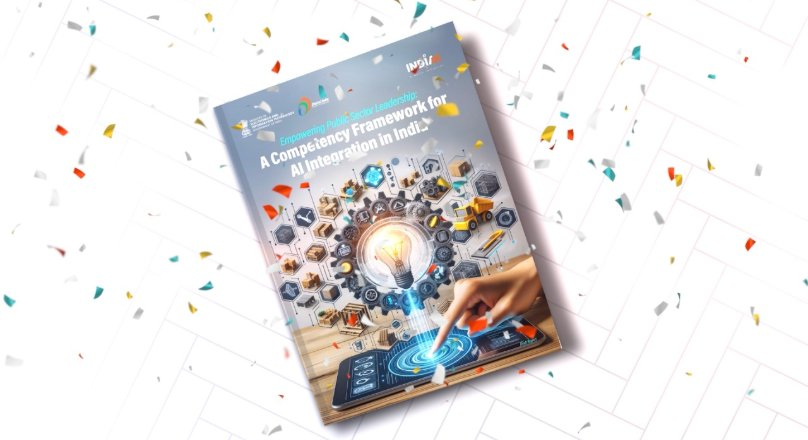Ministry of Electronics and Information Technology (MeitY) takes a monumental step forward with the launch of a competency framework for public sector officials in India on 6th March, 2025. This strategized framework will serve as a blueprint designed to equip public officials with the necessary skills, knowledge, expertise, and ethical grounding to harness AI’s role in a more responsible and accountable manner. Moreover, for a mass-level awareness, targeting public sector officials marks a stepping stone for a manifest success amongst other target sectors.
COMPETENCIES AND CAPACITY BUILDING
According to this framework, the public officials have been categorized into three levels – policy-level, mid-level, and project implementers thereby also delineating specific competencies for each mainly – behavioural, functional and domain-specific. Behavioural competencies like innovative thinking, systems thinking, and a focus on citizens are highlighted to foster a culture of adaptability and ethical responsibility amongst these officials. The aim is to make AL solutions resonate with societal values and effectively tackle the real-world challenges. Functional competencies dealing with a technical side of AI literacy, data governance, and stakeholder management lay a groundwork needed for a successful implementations of AI systems thereby acting with compliance. The domain specific competencies refine skills for key sectors on which basic functionality of nation depends such as – agriculture, healthcare, education, smart cities, and transportation, making AI solutions more impactful than just relevant.
In order to build capacity, this frameworks lays focus on acknowledging different levels of AI readiness across various regions and department, suggests targeted training programs, collaborations in academia and partnerships with leading industry experts and organizations. Initiatives like Certification program in Applied Artificial Intelligence and Future Skills Prime are in motion to enhance expertise and skills of these government officials. Moreover, India’s active participation and collaboration in Global Partnership on AI (GPAI), underscores country’s role in shaping AI governance alongside calling for strong mitigation strategies, enhancing accountability to address the concern that AI decisions can be unclear and hard to understand. Here comes the role of human oversight ensuring that AI systems augment a structured decision-making process rather than replace huma judgment, particularly in instances of high-profile and sensitive industries like healthcare, pharma and criminal justice and judicial decision making.
In highly important and crucial parts of economy such as in agriculture, AI powered tools like National Pest Surveillance System and Krishi 24/7 helps farmers understand detailed aspects of climate changes and combat with challenges such as crop yielding. These initiatives harness the power of AI to deliver real-time insights into pest infestations and weather patterns, helping farmers make well-informed decisions. In the healthcare sectors, the Ayushman Bharat Digital Mission is using AI to streamline diagnostics and enhance patient care, showcasing how technology can improve service delivery in vital areas. Smart city project focusing on the niche area of real estate, are tapping into AI for energy efficiency and effective urban planning whilst the transportation industry has embraced the AI systems to boost road safety and cut down on road congestion. In other words, these are some basic examples wherein AI is being adapted and integrated deep into roots of daily life theoretical ideas and change their functional abilities so that it has some real benefits.
GOVERNANCE IS THE NEED OF THE HOUR
The framework’s suggestions for establishing AI governance are especially significant. Creation of AI Governance Board is advocated to ensure ethical compliance, standardized risk assessments and maintenance of transparent procurement processes. Privacy and data management protocols is crucial for protecting citizen rights, whilst the proposed public engagement platforms prove credible, reliable and trustworthy. These initiatives reflect a progressive mindset that balances innovation with accountability, making sure that AI systems are implemented ethically and responsibly. The document also stresses the need for ongoing monitoring and impact assessments to understand the social, economic, and ethical effects of AI systems, particularly on marginalized and vulnerable communities.
This framework is a progressive thinking document paving the way for a future where AI can drive equitable development across domains, across individuals and across the world. Equipping public sector officials becomes significant since they engage with the public at large on the ground level and can help address their concerns more effectively, AI can reduce their workload and enhance their efficiency by equipping them with essential skills, encouraging cross-sector collaboration and also laying an ethical boundary of principles into these systems. The success of this framework is however, largely dependent on a commitment to adapt such shift in working of economy, willingness to undergo training and maintaining a larger focus on serving citizens – the real beneficiaries of this AI-driven world.
This document aligns with the IndiaAI Mission, aiming at a safer, nuanced and quality usage of AI fostering innovation whilst also ensuring inclusive growth and digital transformation. The desire of achieving these objectives is also the biggest challenge that AI faces in India primarily – lack of awareness and secondary to it – data privacy, algorithmic biases and collusions thereby posing a greater threat on its ethical and fair usage. This framework assumes significance highlighting India’s commitment to leveraging AI for public good while safeguarding societal interests.

